
-
Find the right food for your petTake this quiz to see which food may be the best for your furry friend.Find the right food for your petTake this quiz to see which food may be the best for your furry friend.Featured products
 Mature Adult Dog Food
Mature Adult Dog FoodHill's Science Plan Mature Adult Multipack Wet Dog Food with Chicken & Beef are complete premium pet foods for mature adult dogs from 7 years. Your dog will love these deliciously smooth and savoury minced loaves, formulated to deliver the appropriate amount of energy to support the needs of adult dogs.
Shop Now Adult Wet Dog Food with Beef
Adult Wet Dog Food with BeefHill's Science Plan Adult Multipack Wet Dog Food with Chicken, Beef & Turkey are complete premium pet foods for adult dogs from 1 year. Your dog will love these deliciously smooth and savoury minced loaves, formulated for balanced nutrition and overall health.
Shop Now Puppy Food
Puppy FoodHill's Science Plan Puppy Multipack Wet Dog Food with Chicken & Beef are complete premium pet foods for growing puppies from weaning until 1 year old and for pregnant and nursing dogs. Your puppy will love these deliciously smooth and savoury minced loaves, formulated for balanced nutrition and overall health.
Shop NowFeatured products Mature Adult Wet Cat Food with Chicken
Mature Adult Wet Cat Food with Chicken
Tender chicken chunks in gravy for mature adult cats. Made with easy-to-digest ingredients, high-quality protein for lean muscle maintenance and antioxidant vitamins C+E for optimal health.
Shop Now Light Adult Multipack Wet Cat Food with Chicken & Ocean Fish
Light Adult Multipack Wet Cat Food with Chicken & Ocean FishTender chicken chunks in gravy for cats, with L-carnitine and fewer calories for ideal weight management. Packed with high-quality protein, omega-6s, and vitamin E for shiny fur and healthy skin.
Shop Now Adult Multipack Wet Cat Food with Beef, Ocean Fish & Chicken
Adult Multipack Wet Cat Food with Beef, Ocean Fish & ChickenTender chunks in gravy for cats, with high-quality protein to maintain lean muscle. With vitamin E and omega-3s & -6s for healthy skin and balanced minerals to support healthy vital organs.
Shop Now -
Dog
- Dog Tips & Articles
-
Health Category
- Weight
- Food & Environmental Sensitivities
- Urinary
- Digestive
- Joint
- Kidney
-
Life Stage
- Puppy Nutrition
- Adult Nutrition
- Senior Nutrition
Cat- Cat Tips & Articles
-
Health Category
- Weight
- Skin & Food Sensitivities
- Urinary
- Digestive
- Kidney
-
Life Stage
- Kitten Nutrition
- Adult Nutrition
Featured articles The Incredible Science Behind Your Pet's Microbiome
The Incredible Science Behind Your Pet's MicrobiomeLearn what your pet's microbiome is, how it contributes to your pet's gut and overall health, and why nutrition is important in maintaining healthy microbiomes.
Read More Show some love with wet foods: a great choice for pets with health issues
Show some love with wet foods: a great choice for pets with health issuesShow some love with wet foods: a great choice for pets with health issues.
Read More The Right Diet For Your Pet
The Right Diet For Your PetIn people, the right diet is very important. If you are eating the wrong way for your metabolism, activity level, age and lifestyle you could end up with health issues.
Read More -


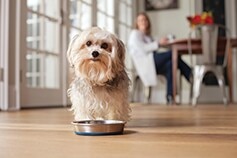
While we consider dogs to be members of our family, feeding them the same food we eat can cause injury to them. Dogs are not used to eating the oily, fatty foods that we do, and they can get diarrhoea and upset stomachs from them. It’s important to know what foods are toxic to dogs and avoid them.
Chocolate and Caffeine
It’s a pretty well-known fact that chocolate is harmful to dogs. Unlike their feline friends, most dogs don’t have an “off” button when it comes to finding food. The amount and type of chocolate your dog consumes determines the symptoms and toxicity level they will experience. Symptoms can include vomiting, diarrhoea, increased thirst, abdominal discomfort, lethargy, muscle tremors, irregular heartbeat, high body temperature, seizures and death. The darker the chocolate is (for instance, baker’s chocolate or cocoa powder), the more dangerous it is to your puppy. They contain a higher concentration of caffeine and theobromine, both of which cause toxicosis in dogs. Keep your dog away from caffeinated beverages as well.
Grapes and Raisins
While grapes and raisins are not harmful to some dogs, they have been associated with kidney failure in others. Simply put, it’s not worth the risk to find out! Vomiting, lethargy and diarrhoea can occur within 12 hours of ingestion. If the symptoms are not treated, they can lead to dehydration, decreased appetite and increased urination followed by decreased urination. If your dog has consumed grapes or raisins and these signs occur, take them to a vet immediately. Your dog can develop long-term kidney disease or even die from kidney failure within three to four days.


Tasty Tips
Alcohol and Raw Bread Dough
Small amounts of alcohol found in drinks, syrups and raw bread dough can be poisonous to dogs. These products contain ethanol, and beer also contains hops, both of which can cause alcohol intoxication. Signs of intoxication include vomiting, disorientation, high body temperature, restlessness, excessive panting, muscle tremors and seizures. Dogs who show signs of alcohol intoxication should be monitored by a vet until they recover, as it can cause failure of the organ systems and even death. The yeast in raw bread dough can also cause stomach expansion, which can result in tissue damage and difficulty breathing.
Xylitol
Xylitol is an artificial sweetener found in foods like sugarless gum, sugar-free candy and baked goods. It can also be found in toothpaste, mouthwash, chewable vitamins and cough drops. Ingestion can cause a life-threatening drop in your dog’s blood sugar, as well as liver damage. Symptoms include vomiting, seizures and loss of coordination, which can occur anywhere from a few minutes to several hours after ingestion. According to the Pet Poison Helpline, a 10-pound dog would only need to eat a single piece of sugar-free gum to reach a potentially toxic dose. Dogs that ingest large amounts of xylitol can also develop liver failure. If you suspect that your dog has consumed anything that might contain Xylitol it is important that you contact your vet immediately.
Onions and Garlic
Anything in the onion family–from garlic to shallots to spring onion to chives–is toxic to dogs. They contain compounds that can cause gastroenteritis, anaemia and serious damage to the red blood cells. Garlic is considered to be five times as potent as onions. Signs of onion or garlic poisoning often do not appear for several days after ingestion, but include lethargy, weakness and orange- to dark red-tinged urine. Japanese breeds of dogs such as Akitas and Shiba Inus tend to be more sensitive to garlic and onions.
Other Foods Harmful to Dogs
Dairy products can upset your dog’s digestive system and cause diarrhoea as well as food allergies. Ingestion of just a few macadamia nuts can cause weakness, paralysis and lack of coordination. Avocados contain persin, which can cause mild stomach upset in dogs. The bones in meat, chicken and fish can also be very hazardous to your dog. They can splinter and stick in the throat, break teeth or cut the intestines.
If you are unsure if you can feed a food to your dog, always consult your veterinarian first. As a general rule of thumb it is best to avoid feeding your dog human food anyway. While it can be hard to ignore those puppy dog eyes looking at you at the dinner table, feeding your dog can often result in weight gain among other more serious issues. To keep your dog out of harm’s way, it is best to stick to a diet of food specifically formulated to meet your dog’s nutritional needs.


One of our staff authors prepared this article for you
Related products

Hill's Science Plan Puppy Multipack Wet Dog Food with Chicken & Beef are complete premium pet foods for growing puppies from weaning until 1 year old and for pregnant and nursing dogs. Your puppy will love these deliciously smooth and savoury minced loaves, formulated for balanced nutrition and overall health.

Hill's Science Plan Mature Adult Multipack Wet Dog Food with Chicken & Beef are complete premium pet foods for mature adult dogs from 7 years. Your dog will love these deliciously smooth and savoury minced loaves, formulated to deliver the appropriate amount of energy to support the needs of adult dogs.

Hill's Science Plan Adult Multipack Wet Dog Food with Chicken, Beef & Turkey are complete premium pet foods for adult dogs from 1 year. Your dog will love these deliciously smooth and savoury minced loaves, formulated for balanced nutrition and overall health.
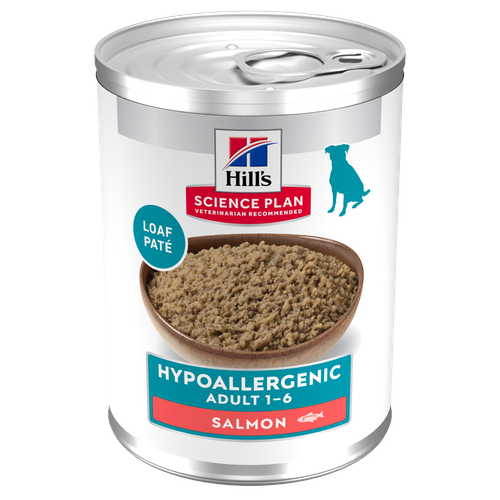
Hill's Science Plan Hypoallergenic Adult Wet Dog Food with Salmon is a complete premium pet food for all adult dogs from 1 year. This savoury tinned loaf is specially formulated for dogs with delicate skin and stomachs. It features a single novel animal protein source and is grain-free.
Related articles
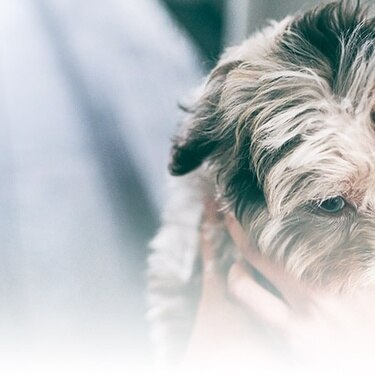
How, when and what to feed your new puppy is an important decision, learn more about the things to consider for feeding your puppy.
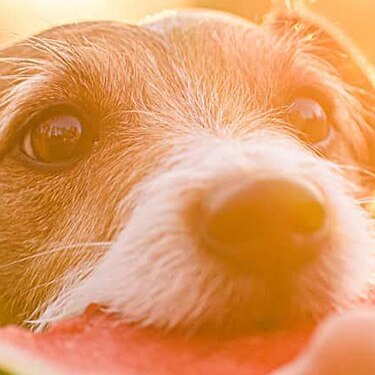
Watermelon is usually a healthy treat for dogs, but learn the tips about its safety, which parts are OK to feed your dog, and how much is a healthy amount.
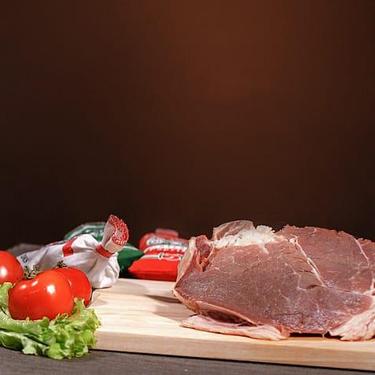
Learn about the potential health risks of a raw diet for dogs and why they aren't the best option for your pup or you.

Learn effective tips for feeding a dog that's a picky eater and ensure proper nutrition for a finicky eater. Discover tips for pet parents at Hill's Pet UK.

Put your dog on a diet without them knowing
Our low calorie formula helps you control your dog's weight. It's packed with high-quality protein for building lean muscles, and made with purposeful ingredients for a flavourful, nutritious meal. Clinically proven antioxidants, Vitamin C+E, help promote a healthy immune system.
Put your dog on a diet without them knowing
Our low calorie formula helps you control your dog's weight. It's packed with high-quality protein for building lean muscles, and made with purposeful ingredients for a flavourful, nutritious meal. Clinically proven antioxidants, Vitamin C+E, help promote a healthy immune system.

